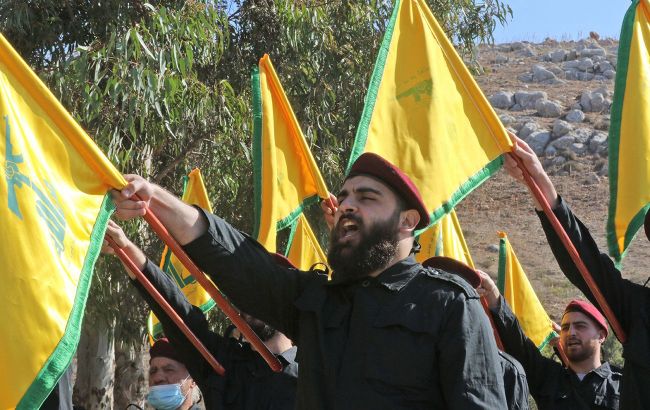Hezbollah hits Israel, prompting retaliation and war warnings: Situation analysis
 Photo: Hezbollah shells a stadium in the Golan Heights (Getty Images)
Photo: Hezbollah shells a stadium in the Golan Heights (Getty Images)
Lebanese terrorist group Hezbollah bombards a stadium in the Golan Heights settlement, killing 12 Israelis, most of them children. Israel responds by striking Hezbollah targets in Lebanon and threatens "devastating" war.
RBC-Ukraine has gathered everything currently known about the new escalation in the Middle East.
Contents:
What happened in the Golan Heights
On the evening of Saturday, July 27, the city of Majdal Shams came under fire. One of the rockets hit a stadium where children were present. As a result of the attack, 12 people aged 10 to 20 were killed, mostly teenagers. At least 19 more people were injured to varying degrees.
Israel immediately blamed the terrorist group Hezbollah for the attack, stating that the rocket was launched from the Shebaa area in Lebanon. However, the Lebanese group denied responsibility for the shelling, claiming they were not involved.
But, as reported by the Israel Defense Forces (IDF), an expert examination revealed that the stadium was hit by an Iranian-made Falaq-1 rocket. "The forensic findings at the scene point to this rocket. Falaq-1 is only in use by the Hezbollah terror group, which carried out this attack from Chebaa," said IDF spokesperson Daniel Hagari.
The Golan Heights, a former Syrian territory, was captured by Israel during the Six-Day War in 1967. The Golan is located in northern Israel and borders Lebanon.
Israel’s response
Following reports of the strike on the stadium in Majdal Shams, Israeli Prime Minister Benjamin Netanyahu urgently traveled from Washington to Tel Aviv, and Defense Minister Yoav Gallant held a meeting with military leadership to determine the course of action in response to the Hezbollah attack. Gallant's specific response plan was not disclosed.
However, last night, Israeli aviation carried out a series of strikes on Hezbollah targets in Lebanon, both deep inside and in the south of the country. According to the IDF, weapons depots and terrorist infrastructure in several regions of Lebanon were targeted.
מטוסי קרב תקפו במהלך הלילה שורת מטרות טרור של ארגון הטרור חיזבאללה ברחבי לבנון.
— צבא ההגנה לישראל (@idfonline) July 28, 2024
בין המטרות שהותקפו בעומק ובדרום לבנון, מצבורי אמל"ח ותשתיות טרור במרחבים שבריחה, בורג' א-שמאלי, בקאע, כפר כילא, רב א-תלתין, אל-חיאם וטיר חרפא pic.twitter.com/nUpOGqTWtK
The conflict between Israel and Hezbollah did not end there. In Tel Aviv, following the stadium attack, a series of very harsh statements were made, effectively threatening a war with Hezbollah in Lebanon.
Just yesterday, Israeli Foreign Minister Israel Katz stated that Lebanese militants had crossed "red lines," which, as reported by Axios, raised concerns in the U.S. administration that this could escalate into a war between Israel and Lebanon.
Today, Israeli Foreign Ministry spokesman Oren Marmorstein said that Israel "will exercise its right and duty to act in self-defense" and respond to the shelling of the Golan Heights. At the same time, he threatened a "devastating" war for Lebanon and outlined a way to avoid it.
"The only way that the world can prevent a full scale war which would be devastating also to Lebanon is by forcing Hezbollah to implement Security Council Resolution 1701. Now is the very last minute to do so diplomatically," wrote the Foreign Ministry spokesman on the social network X.
What is Hezbollah and why it attack Israel
Hezbollah is a Lebanese Shia paramilitary Islamist organization and political party that controls the southern part of Lebanon. It has been recognized as a terrorist organization in the US, Israel, and Bahrain.
Hezbollah was formed after Israel's invasion of Lebanon in 1982. After its official founding in 1985, several Shia groups, including Islamic Jihad, which is also considered a terrorist organization today, fully or partially joined Hezbollah.
Today, Hezbollah is not only a paramilitary organization but also a political party with seats in the Lebanese parliament.
Since the beginning of the war between Israel and Hamas in the Gaza Strip, Hezbollah militants (supported by Israel's main enemy, Iran) have regularly shelled Israeli territories in support of the Palestinian group. With their strikes, Hezbollah demanded an end to the war in the Gaza Strip, to which Israel responded by shelling militant positions in Lebanon.
The constant shelling has turned northern Israel into a "gray zone," with more than 80,000 residents evacuated from the region and tens of thousands of buildings and businesses damaged.
Despite this, the conflict between Israel and Hezbollah has not yet escalated into a ground operation. As explained in an RBC-Ukraine article by expert David Handelman, such a war would be much more challenging for Israel than the operation against Hamas.
"It might come to that because the situation on the northern border cannot continue indefinitely as it is," he told RBC-Ukraine, explaining that even if Hezbollah stops the shelling, it will not disappear and can resume attacks at any moment.
It should be noted that in response to the shelling of the Golan Heights, the US called it "horrific" and promised to continue supporting Israel.
Sources: news from The Times of Israel, Axios, The Jerusalem Post, statements by the IDF and Israeli Foreign Ministry spokesman Oren Marmorstein, as well as expert commentary by David Hendelman for a previous RBC-Ukraine article.

